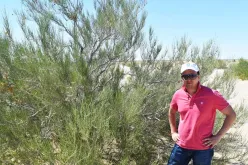Jasurjon Ibragimov supports a climate adaptation project to fortify farming communities in drought-prone parts of Uzbekistan. Serving with the United Nations Development Programme (UNDP), he shares why education on climate change is imperative and needs to start early.
Jasurjon supports the UNDP project Developing the climate resilience of farming communities in drought-prone parts of Uzbekistan,1 funded by the Adaptation Fund of the UN Framework Convention on Climate Change (UNFCCC).His assignment is centred on public relations, content development and organizing working sessions with stakeholders.
“One of the most interesting parts of my work is bringing project stakeholders together to work on new challenges arising during the implementation of the project,” says Jasurjon.
Jasurjon assisted in the procurement of hotbeds and greenhouses, which enabled more than 1,000 families in the project pilot districts in earning income. Additionally, he contributed to purchasing electrolysis facilities for the production of sodium hypochlorite. This compound can be used as a disinfectant, and is an integral part of project activities to stop the spread of the Coronavirus.
“I learned the full cycle of the project, and strengthened my knowledge through specialized training,” Jasurjon shares. “For example, I learned about scaling-up sustainable development solutions and different approaches to agriculture at the training on South-South and Triangular Cooperation in Implementing the 2030 Agenda: Youth4South Edition in Istanbul in 2018.”
Taking the lead in environment and climate education for the young, Jasurjon also supports Climate Box, another UNDP initiative.
With the help of our UN Volunteer, the Adaptation Project supported the Climate Box initiative. It is great that even during quarantine, children can continue learning about nature and the environment. --Malika Musaeva, Public Relations and Outreach Specialist of the Adaptation Project
During May, Jasurjon conducted an online lesson for third graders of school #46 in Nukus, Karakalpakstan. He explained climate change and the consequences of the disappearance of the Aral Sea. The participants explored how each of them can help to protect nature through individual actions.
Combating climate change involves a complex and integrated approach, and it is necessary to start at school level in order to instil knowledge. We are now planning to disseminate the greatest possible number of Climate Box toolkits to ensure larger coverage of schools in Uzbekistan. --Jasurjon Ibragimov
Climate Box is an international interactive learning programme that teaches school children the science behind climate change and gives them practical tips on how to reduce their footprint. It was developed by UNDP and supported by several partners. Among the authors are leading climate experts, scientists, teachers and professional children’s authors. In Uzbekistan, 168 teachers across 36 schools and three universities are engaged in this initiative, impacting some 1,500 students.
Volunteers like Jasurjon inspire young people and communities to take voluntary action to change their behaviour and impact their broader community.

National UN Volunteer Jasurjon Ibragimov (second from left) with former UN Volunteers Seohyeon Yang (left), Hyojin Lee (second from right) and Makhbuba Khamraeva (far right). ©UNDP, 2019
1More about the project.: Developing climate resilience of farming communities in the drought prone parts of Uzbekistan
The main objective of this project is to create climate-resilient agricultural and livestock farms located in the most drought-prone regions of Uzbekistan, in particular in the Republic of Karakalpakstan. Due to its geographic location, arid climatic conditions and the anthropogenic disaster caused by the drying up of the Aral Sea, Karakalpakstan is one of the most vulnerable regions to climate change in Uzbekistan.
Karakalpakstan is located in the lower reaches of the main rivers of the Aral Basin, and often water reaches this region in small quantities and is of low quality. Sometimes there is no water coming from the upper regions, especially during the drought periods, and the situation with water resources becomes catastrophic.
The project consists of four main components delivered by national and international partners:
- Institutional capacity and mechanisms for drought risk management and early warning
- Climate resilient agricultural and pastoral production systems
- Landscape level approach to adaptation to climate change risks of increased aridity
- Knowledge management and awareness raising

National UN Volunteer Jasurjon Ibragimov and former national UN Volunteer Makhbuba Khamraeva. ©UNDP, 2019
This article was prepared with the kind support of Online Volunteers José María Sainz Maza del Olmo and Barry Kaminsky and also published by UNDP.

